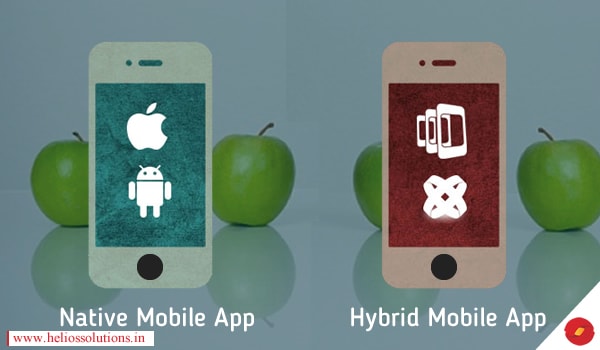Mobile App Development is slowly gaining momentum since the market is seeing increase in demand for these applications. But development of a mobile application has to consider many factors like the target audience culture, habits and preferences, geography etc. Today, there is a mobile app for everything, you name it and there is one for it – dating or finance or gaming!
Before getting into the aspects of Native apps and hybrid apps, one thing we all need to have clarity on is the importance of mobile phone. When you are creating an application for a mobile device, you need to understand its importance. Mobile devices like Smart Phones and Tablets have become a daily part of people’s lives; they have them at all times. Thus, it is necessary for these devices to respond quickly, it needs to be reliable. This is a by default expectation for all users.
“79% of consumers would retry a mobile app only once or twice if it failed to work the first time, only 16% would give it more than two attempts. Poor mobile app experience is likely to discourage users from using an app again.”
(Information Source: A Global Study of Consumers’ Expectations and Experiences of Mobile Applications)
Coming to the point, it is can be very crucial to decide which kind of mobile app should be development. We are here to help you for the same. Let’s clear all the second thought for your decision for mobile app development.
User Experience is Priority
We understand that mobile applications need to offer intuitive and dynamic experiences, as at the end of the day everything boils down to user experiences. When you choose a hybrid application, you need to consider the performance drawbacks but with a mobile development expert team, it can be resolved.
The record says that native apps offer better user experiences than hybrid mobile apps. The debate of hybrid and native app has been going on for long now. Talk to mobile app development experts at Helios Solutions to introduce gamification techniques for better user experiences.
Native Mobile App
Faster
Native users allow users to quickly learn the app. A native app is developed specifically for a mobile operating system (Objective – C or Swift for iOS vs. Java for Android). It is developed in a more mature ecosystem. It offers better in-app interaction that avails a consistent look and feel with other native apps on the device. This is indeed very beneficial to the end user and the process of using the app is faster. The development process is also faster due to the availability of resources and because the code in native platforms runs faster.
Great Support
There is great support available for native applications like readymade plugins and many libraries. Thus finding resources like SDKs is easier in case of native app development. New features can be integrated easily and quickly without much hassle.
Good for Complex Applications
If the mobile app is about creating a very impressive set of features which are highly complex or it requires very dynamic and extraordinary features, then it is always better to go for native apps. It offers access and utilizes the built-in capabilities of user’s device. It is harder for cross platform tools to compete with two giants – iOS & Android in native apps.
Hardware likes it!
To integrate features like gestures, multi-touch events, geo location tracking etc in native technologies. It offers great flexibility and scalability. If there is any problem while development in native applications, you can always find solutions. This is one of the advantages because the devices are specifically designed considering the features of native apps.
Yes, native platforms for mobile app development are becoming more fragmented in the context of user interfaces and for integration with company’s products. Both the native platforms are offering smooth user experience that allows people to associate with the help of introducing new technologies like Google Email API or Swift language. This is helping developers to create seamless user experiences across desktop and mobile devices.
Hybrid Mobile App
Best for Simple Mobile Apps
Developing a hybrid app is generally selected in case of simple application. If you are looking for very complex features, than hybrid app may not perform its capabilities well. Any tool or technology used for hybrid or cross platform development, you have to write only one code that works across multiple platforms.
Allows Multi Platform Development
PhoneGap, Xamarin and other such platforms offers hybrid mobile app development. Hybrid apps can look attractive across platforms as the giants Android and iOS support JavaScript.
Cost Effective Development
Because the development is simple, the cost of development is reduced. As in case of native apps, you have two different teams working on it for different platforms. You don’t have to invest in the team. Moreover, because the code is one, the time of development is also reduced.
Limited Resources
The drawback with cross platform development is the availability of resources. Because here we are talking about a solution for cross platforms, it is difficult to find solution that is compatible with each of them especially in this case where there is one code file. This makes implementation complex. There are no readymade libraries available or support for such development.
Have an Idea?
We are ready to turn your idea into reality. Our teams of mobile development experts like iPhone development specialists, Android Development Experts and Sencha Development Specialists will help you meet the desired requirements of native applications or cross platform hybrid app development. Tell us your thoughts and possibilities and we will help you achieve your goals.




